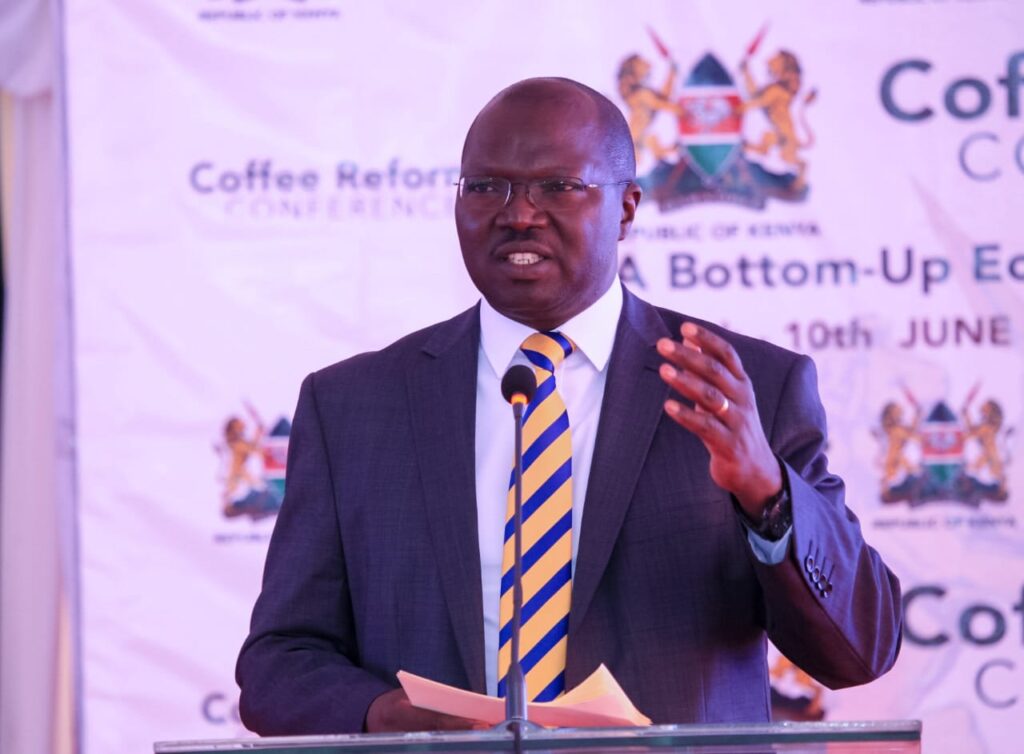
Mr.Simon Chelugui,EGH Cabinet Secretary Ministry of Co-operatives & Micro, Small and Medium Enterprises Development
- Digital Transformation Fuels Kenya’s Cooperative Revolution and MSMEs
- Kenya’s Ministry Leads the Charge for SME Empowerment and Economic Transformation
By BQ Editorial Team;
The cooperative movement, deeply rooted in Kenya’s history, has played a significant role in uplifting communities and empowering individuals.
Now, with the advent of digitalization, the Ministry of Co-operatives & Micro, Small and Medium Enterprises (MSMEs) is embarking on a new chapter, harnessing the power of technology to revolutionize the cooperative landscape.
Kenya had long been regarded as a trailblazer in the cooperative sector,ranking among the top countries globally. Today, the country’s
cooperatives have become a cornerstone of the economy, fostering entrepreneurship and providing employment opportunities to millions.
Recognizing the importance of Micro and Small Medium Enterprises (MSMEs) in driving economic growth, the Ministry set its sights on
transforming the sector.
 MSMEs have become a significant driver of economic growth in many countries. However, despite their crucial role, MSMEs have faced
MSMEs have become a significant driver of economic growth in many countries. However, despite their crucial role, MSMEs have faced
various obstacles that have impeded their growth and development.One of the most significant challenges that MSMEs have encountered is
the lack of a comprehensive database that contains all the relevant information about them.
To tackle this issue, the government has initiated a program to establish a centralized repository of information for all SMEs. The primary
objective of this initiative is to provide comprehensive details about MSMEs, such as their size, location, ownership structure, and other
relevant data.
The aim of this initiative is to make it easier for MSMEs to access credit facilities, market opportunities, and other resources necessary for their growth and development.This database would serve as a valuable resource, offering insights into the sector’s strengths, weaknesses, and opportunities.
Cooperatives Go Digital
With a keen understanding of the cooperative sector’s potential, the government aims to boost its contribution to the GDP beyond its current 2-3%. Supporting MSMEs
To support the growth of MSMEs and address specific industry needs, the government had put plans in motion. Cold storage facilities were
being established in Tigani, Ol Kalou, and Kisii, ensuring that agricultural produce, such as potatoes, could be stored properly, preventing
spoilage and preserving farmer’s livelihoods.
Additionally, notable Saccos in Gikomba, renowned for their secondhand clothing sales, were collaborating with the government and county
authorities to strengthen partnerships and create favorable conditions for their operations.

The Ministry is aware of the importance of engagement and collaboration, and aims to cultivate partnerships not only within the government but also with county governments. In Kenya, there are over 26,000 registered cooperatives with an astounding 14 million members,
making the potential for a collective impact immense.
Cabinet Secretary, Mr. Simon Chelugui, states that these cooperatives hold assets worth 1.5 trillion shillings and deposits in Sacco movements totaling 1 trillion shillings. Recognizing the significance of empowering these cooperatives, the government has pledged to support their growth and facilitate better financial outcomes.
As the nation celebrated Madaraka Day, an important commemoration of Kenya’s attainment of self-governance, the theme of Cooperative
MSME and Revenue Generation took centre stage. The government acknowledged the crucial role played by cooperatives across the country and pledged to implement initiatives that would generate more revenue and create a conducive environment for their
success.
Embracing digitalization was a key component of the cooperative sector’s transformation. The ministry has set its sights on passing a
Cooperative bill that would ensure the inclusion of Saccos and provide support for their growth.To that end, innovative projects like Coop Tech were launched in Mombasa, bringing together over 54 mainstream Saccos, while Sacco
 Central made its debut in Nairobi, with over 50 Saccos and shared services joining forces. These initiatives aimed to streamline operations, reduce costs, and improve service delivery. By enabling the use of the same ATM cards across multiple Saccos and facilitating seamless account switching, these advancements would drive down transaction costs and enhance accessibility.
Central made its debut in Nairobi, with over 50 Saccos and shared services joining forces. These initiatives aimed to streamline operations, reduce costs, and improve service delivery. By enabling the use of the same ATM cards across multiple Saccos and facilitating seamless account switching, these advancements would drive down transaction costs and enhance accessibility.
Cooperative Sector;
Kenya’s cooperative sector also recognized the importance of learning from global counterparts. International cooperative forums, such as the upcoming one in Vancouver, offered a platform for peer learning, enabling stakeholders to gain insights from successful cooperative
models worldwide. The forums attracted cooperatives from large markets like the United States and Canada, presenting invaluable
opportunities for knowledge exchange and fostering growth.
The government has taken an holistic approach to its efforts, prioritizing financial services, agriculture, and other productive sectors such as
cotton, rice, and tea.With over 200,000 hectares of land under cooperative ownership, the sector held tremendous potential to address
critical infrastructure needs, including power, water, and road development.
Recognizing the housing shortage in the country, the ministry sought partnerships with the Ministry of Housing to address the demand for over 250,000 houses. Collaborative efforts were underway in major cities like Nairobi, Mombasa, and Nakuru to tackle these challenges head-on.
Ministry Hurdles
While the Ministry has made significant strides, it was not without its own hurdles. Mr. Chelugui, had inherited a substantial debt of 3.4 billion shillings when he assumed his role. However, through diligent efforts, the ministry has managed to recover 2 billion shillings from various employers, and Mr. Chelugui was determined to retrieve the remaining 1.4 billion shillings in arrears.
Prompt remittance of payments was essential to ensuring smooth service delivery, as delays often hindered the efficient operation of
services.Undoubtedly, the private sector played a vital role in driving the cooperative revolution.The Ministry has successfully forged partnerships with financial institutions like Family Bank and KCB, as well as a prominent telecommunications company

Hustler Fund;
This collaboration facilitated access to financial services for millions of Kenyans, disbursing an impressive 27 billion shillings in loans. The
substantial repayments, totaling 18 billion shillings, highlighted the effectiveness of these partnerships in driving growth and reaching
diverse regions and communities.
With an eye toward the future, the Ministry has sought to expand its horizons further.It aims to establish partnerships with countries like
India, leveraging their expertise in SME-driven economies.
India’s vast population of approximately 1.4 billion people and its thriving SME sector, contributing 29 to 30% to the economy, presented an
exciting opportunity for collaboration.Kenya, with its 98% SMEs, has the potential to learn from India’s success story and significantly increase its own SME contribution to the economy.
As the country celebrated its 60th anniversary,the ministry has emphasized the need for a paradigm shift in service delivery. It aims to
embrace technology, enhance productivity, and empower cooperatives and Saccos to create lasting change in communities across the country. CS Chelugui’s vision for the future centered on reengineering services, promoting efficiency, and maximizing the potential of cooperatives and Saccos as engines of economic growth.










1 thought on “FEATURE:Digital Transformation Fuels Kenya’s Cooperative Revolution and MSMEs”